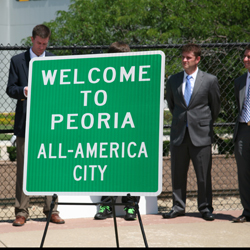
Tips for engaging the public and handling a crisis…
Have you ever wondered if people are paying attention to you? You can write about your business/organization all sorts of ways, but do people hear it? Are they listening… watching… reading?
This is something we talk about a lot as public relations/communication/marketing professionals in Public Relations Association of Central Illinois. None of us individually have all the answers, but collectively, watch out! We learn from one another and invite guests to teach us about their successes. We’ve covered a lot of ground so far this year, and would like to share some of the tips we’ve learned along the way. Here are a few “aha!” moments...
Engaging Campaigns
Engaging the public is important for public relations, and visual displays go a long way to get attention. You have to be guessing what we’re referring to here: Peoria’s impressive All America City campaign. From a collaborative video and drum line to the dynamic, attention-grabbing presentation in Colorado, the campaign made a splash that PR professionals would call heaven. So how do you do it? Here are our simplified tips:
- Identify your message and be truthful. In this case, the Young Professionals of Greater Peoria identified what they truly loved about Peoria, and didn’t try to sell anything about Peoria that wasn’t really a staple.
- Find passionate leaders. The people representing your message to the public have to be engaging, dynamic and passionate, or you’re dead in the water. You absolutely can’t launch an engagement campaign with a less-than-appealing delivery.
- Balance facts and data with visual representation. People need facts and data to believe you, but the presentation of that information does not have to be boring. Get visually creative and use a variety of vehicles to get your message out.
Get Social!
Did you know 30 percent of adults get their news from Facebook? We’re not kidding. Pew Research journalists published that statistic, among others, last November. Next in line was YouTube at 10 percent and Twitter at eight percent. Remember, these are not the percentages of adults who use these vehicles; they are the percentages of adults who get their news and information from these sources. No business can ignore that. If you’re not using social media outlets for your business, you’re behind. Remember:
- It has to look good. Your business profile appearance matters. Invest time into developing a positive and accurate image. Include thorough information. Link to appropriate websites, and be sure to have pictures, hours, contact information, etc. This is basic, but a lot of big businesses lack some of this information.
- Include thorough information. Link to appropriate websites, and be sure to have pictures, hours, contact information, etc. This is basic, but a lot of big businesses lack some of this information
- It’s not just a forum for downloads. You can’t just blast information out to people and let that be it. There has to be interaction; you have to actively get social with people. Don’t just post a message when you want something. You are asking followers to spend time on your page—show them you value that by taking the time as well.
For the Love of Events
Public relations professionals (or people stuck wearing the PR hat) often end up being the lucky individuals who execute event planning, so we study best practices for that, too. Our favorite tips from this luncheon are below:
- Think of every moment as an opportunity to make each guest feel like they are the only one who matters. That doesn’t mean you need to personalize everything, but be personal.
- Successful events don’t necessarily need a big budget. Customer service, kindness and excellent planning go a long way.
- Walk through each aspect of the event from the guest perspective—from walking in the door and hanging up your coat to leaving at the end of the night. Do people know where to go? Will they feel comfortable? Will they understand the program and how it relates to them? These are all great questions to ask.
How to Handle Bad Press
It’s a tough but necessary topic. Here are some key things we learned that we want to share:
- Have a crisis communication plan. It doesn’t matter if you are a nonprofit, a bank, a government organization or anything in between. What is your nightmare or worst-case scenario? Picture it and come up with a crisis plan to address it. Think about where you would have a press conference and who the contact people would be. Is your story prepared? Do you have talking points?
- Honesty and a good spokesperson can calm things quickly. Make sure your business is on the same page about how to handle bad press—whether it be traditional media or social media. For social media, respond once and move on. Don’t have a battle over social media. iBi
Meghan Lundeen is president of the Public Relations Association of Central Illinois.

